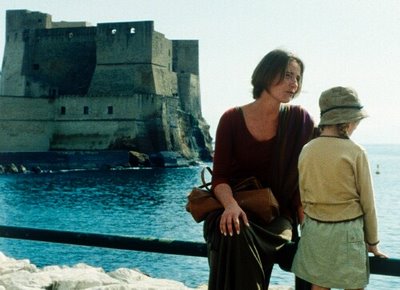 In A Talking Picture, 96-year-old Portuguese director Manoel de Oliveira takes us on a journey through history, making us acutely aware of our heritage and, in the process, conveying an acute sense of what we have lost and what we have become. Part travelogue, part comedy, and part drama, the film lulls us into a state of blissful contentment, then hits us with a wake up call that seems culled from yesterday's headlines. On the surface, Oliveira's 36th film is simple, but its greatness lies in the subtlety of its undercurrents. As we travel on a cruise ship to visit some of the most historic landmarks on the planet, bathe in the warmth of the Mediterranean sun, and meet some interesting people along the way, Oliveira brings into sharp focus the treacherous nature of the journey in which we are embarked.
In A Talking Picture, 96-year-old Portuguese director Manoel de Oliveira takes us on a journey through history, making us acutely aware of our heritage and, in the process, conveying an acute sense of what we have lost and what we have become. Part travelogue, part comedy, and part drama, the film lulls us into a state of blissful contentment, then hits us with a wake up call that seems culled from yesterday's headlines. On the surface, Oliveira's 36th film is simple, but its greatness lies in the subtlety of its undercurrents. As we travel on a cruise ship to visit some of the most historic landmarks on the planet, bathe in the warmth of the Mediterranean sun, and meet some interesting people along the way, Oliveira brings into sharp focus the treacherous nature of the journey in which we are embarked.Set in July 2001, an attractive history professor from the University of Lisbon, Rosa Maria (Leonor Silveira), takes her seven-year-old daughter Maria Joana (Filipa de Almeida) on a cruise of the Mediterranean from Portugal to Bombay, India where she is planning to meet her husband, an airline pilot. The ship travels from west to east, symbolically depicting the direction in which the balance of the world is shifting. Along the way, they visit the Acropolis and the Parthenon, Mt. Vesuvius and the ruins of Pompeii, the Sphinx and the Pyramids, and the Hagia Sophia, among others. Rosa Maria, who has lectured about the sites but never visited them before, explains the various sites to her attentive and inquisitive daughter who is constantly asking questions.
The little girl asks questions such as "What is a myth?", "Was there really such a Goddess?", "What is a legend?", "What did people do here?". Her mother does her best to interpret history and myth for her daughter telling her stories about Prince Henry and the legendary Portuguese King Sebastian, the mermaids who swam alongside ships to encourage the sailors to explore the unknown, and the muse that inspired poets. She tells her about the Temple of Apollo and the statue of Athena that protected the city and the stories that accompanied the destruction of Pompeii. Like Maria Joana we are mesmerized by what we see, yet each scene is tinged with such a pervasive air of sadness that it seems to suggest we are getting one last look.
The only transition from port to port is the often-repeated view of the prow of the ship slicing through the calm waters. Along the way, the two meet solitary travelers: an old fisherman in Marseilles whose wife died and whose children moved away, a celibate Orthodox priest at the Acropolis, and an older unmarried actor in Egypt. Rosa and her daughter are the only family with children seen in the film. The second part of the film consists mainly of a dinner conversation between the ship's captain John Walesa (John Malkovich), an American of Polish background and three celebrity passengers: Delphine, a French businesswoman (Catherine Deneuve), Francesca, a former Italian model (Stefania Sandrelli) and Helena, a Greek singer (Irene Papas). In "My Dinner With John", the women discuss their personal lives as well as their views on history, art, politics, and civilization and we are treated to a lovely Greek song sung by Irene Papas.
Each talk in his or her own language yet everyone seems to understand each other perfectly. Soon the suave captain invites the professor and her daughter to join the dinner group and gives the little girl a gift of a Muslim doll with a veil over her face, making us aware of who has not been invited to the table. From here, the film veers in an unpredictable direction that seems inevitable only upon repeated viewing. The camera is static throughout and since the film is driven by ideas rather than story line or character development, the journey at times can be a bit tiresome. Yet A Talking Picture is a lovely film filled with moments of beauty and grace. Like the passage of our own life, it is the totality of the experience that is important, an experience that can only be reflected upon from a distance and weighed in the context of the events that are transforming the civilization and culture we once thought would never change.
Ever seen a movie in which you see the characters speak Portugese, French, Italian, English and Greek! I think not. On the technical side the camera never moves and rarely changes position, often creating the impression we are watching talking paintings or pictures!
No comments:
Post a Comment